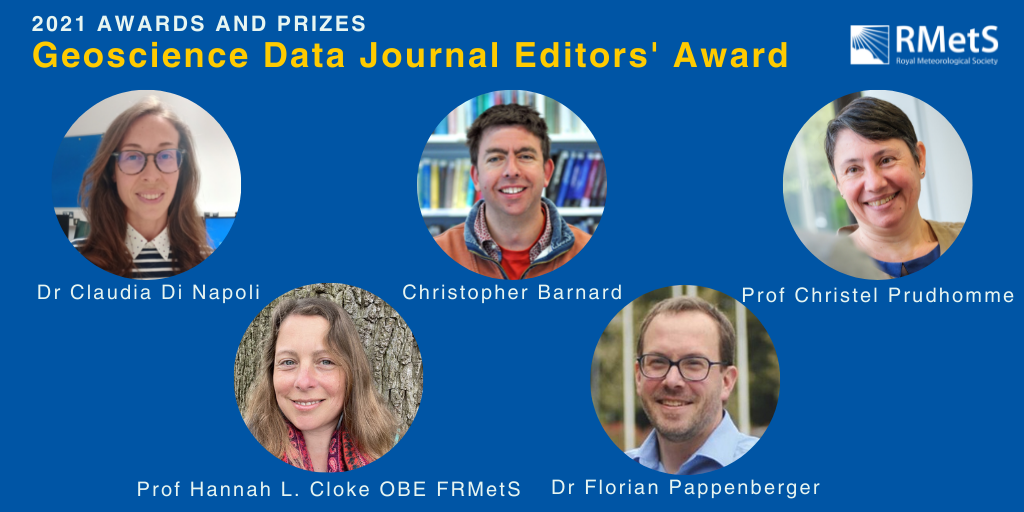

Journal Editors' Awards
- International Journal of Climatology Editors' Award
- Quarterly Journal Editors' Award
- Quarterly Journal Prize Reviewer's Certificate
- Atmospheric Science Letters Editors' Award
- Geoscience Data Journal Editors' Award
- Meteorological Applications Editors' Award
2021 Awards & Prizes
- Distinguished work and careers
- Outstanding contributions published in the Society’s journals
- Original research, innovation and significant contribution to meteorology and its application
- Original contributions of early-career scientists
- Outstanding contribution in public outreach and communication
- Outstanding contribution or service to the Society or the Society’s journal Weather
- Journal Editor's Awards
International Journal of Climatology Editors' Award
Dr Radan Huth, FRMetS

Dr Radan Huth took over as Editor in Chief for the International Journal of Climatology (IJOC) in 2013 and stayed in position until April 2021. During this time he has made a significant and outstanding contribution to the growth and truly international reputation of the journal, growing the journals impact factor to a very respectable 4.069, placing it in the top third of all ranked journals in the Meteorology & Atmospheric Sciences category.
In both 2019 and 2020, he triaged over 1,000 submissions coming into the journal, as well as handling about 10% of these as an Associate Editor.
The Royal Meteorological Society, Wiley and the journal Editorial Board would like to recognise Radan for his commitment, time and dedication to IJOC over the years, as well as his contribution to the Royal Meteorological Society’s journal portfolio as a whole.
|
|---|
Geoscience Data Journal Editors' Award
Claudia Di Napoli et al
Claudia Di Napoli, Christopher Barnard, Christel Prudhomme, Hannah L. Cloke, and Florian Pappenberger are awarded jointly for their paper “ERA5-HEAT: A global gridded historical dataset of human thermal comfort indices from climate reanalysis” which was published in the Geoscience Data Journal in July 2020. ERA5-HEAT (Human thErmAl comforT), is the first and only existing global historical gridded time series dataset of mean radiant temperature (MRT) and the Universal Thermal Climate Index (UTCI) as spatially gridded records at the global scale. ERA5-HEAT open source data set that is free to download and is aimed at a wide range of end users, from scientists to policymakers, with an interest in environment–health applications at any spatial and temporal scale.

|
|---|
Meteorological Applications Editors' Award
Dr Rebecca Emerton

Dr Emerton is one of our most active Associate Editors. She has overseen numerous manuscripts which have required extra guidance to ensure that the revisions were completed to satisfy a tough review process. In addition to fulfilling all of the Associate Editor duties, what Dr Emerton brings to the Editorial Board is her imagination of what Meteorological Applications (Met Apps) should and could be. In particular, her ideas relating to accessibility of content, fairness in review and inclusivity. In the last year, she suggested that we encourage the use of colour maps in graphics that are useful to colour-blind readers. This led to the addition of a “Use of Colour” guide in the journal’s author guidelines. Dr Emerton catches out reviews that are unsatisfactory, in one case a disrespectful review that we dealt with as a team. She supports the journal’s Equality, Diversity and Inclusivity initiatives like our double blind review pilot scheme. She caught out problems when we started this pilot which has helped make the process more robust and ensured that the new double blind review process was properly established. Finally, she is willing to take on extra reviewers who are Early Career Researchers and just beginning to review papers. This creates more work for her in the short-term, but meets a long-term goal of training and growing a reviewer pool of experts who may be future reviewers for Met Apps.
|
|---|
Quarterly Journal Editors' Award
Professor Nedjeljka Žagar

Professor Nedjeljka Zagar has been an Associate Editor for the Quarterly Journal of the Royal Meteorological Society (QJ) since 2013. She has been an extremely effective member of the Editorial Board, expertly handling many papers, particularly in the important areas of data assimilation and tropical wave dynamics where the journal has a high reputation. She has been a great proponent of the journal, encouraging submissions and co-leading the current special issue on the impact of wind observations from the new Aeolus satellite on numerical weather prediction. Nedjeljka has also been an active author, regularly publishing her own work in the journal. The journal Editors would like to nominate her for the QJ editor award in recognition of her all-round contributions to the journal.
|
|---|
Quarterly Journal Prize Reviewer's Certificate
Dr Sergey Frolov

Dr Sergey Frolov receives this award in recognition of his important contribution as reviewer for the Quarterly Journal of the Royal Meteorological Society (QJ). Sergey has taken on a high number of reviews in the area of data assimilation, especially coupled assimilation and ensemble systems, where the QJ has many submissions and demand for expert reviewers. His reviews have been thorough and their high quality was recognised by our Associate Editors at QJ. We are pleased to have this opportunity to show our appreciation for his valued contribution in maintaining the high quality of papers in QJ.
|
|---|
Quarterly Journal Prize Reviewer's Certificate
Dr Lina Boljka
Dr Lina Boljka receives this award in recognition of her valuable contribution as reviewer for the Quarterly Journal of the Royal Meteorological Society (QJ). Lina was recognised by the Associate Editors for the high quality of her reviews and for taking on a review on a challenging topic in atmospheric dynamics which required a substantial investment of time by the reviewer to read the material thoroughly and formulate an insightful review. We are pleased to have this opportunity to show our appreciation for her valued contribution in maintaining the high quality of papers in QJ.
|
|---|
Atmospheric Science Letters Editors' Award
Dr Ana Paula M. A. Cunha
Ana Paula M. A. Cunha receives the Atmospheric Science Letters (ASL) Editor's award in recognition for her paper "Changes in the spatial–temporal patterns of droughts in the Brazilian Northeast" (https://rmets.onlinelibrary.wiley.com/doi/10.1002/asl.855). The paper was the top cited article in ASL in 2020, with 21 citations, and now has over 45 citations (at time of writing). The topic Ana Paula M. A. Cunha's paper deals with is very urgent, the evolution of droughts in Brazil in previous decades and the need to analyse them at a high resolution to detect the impact of local effects which can play a major role in the amplification of drought events. This interesting and highly applicable paper has contributed significantly to the increase in Impact Factor (IF) of ASL over the past years for which the Editors are thankful. ASL does not receive many manuscripts relating to South America and the Editors are grateful to the authors for submitting to ASL, and it is hoped that more manuscripts focusing on this area and topic will be submitted in future.
|
|---|

